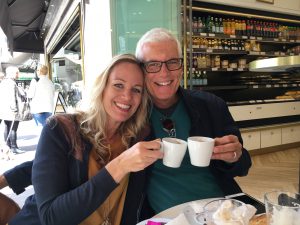What if you're a non-shy introvert or a shy extrovert? That might sound crazy to some of you, if you confuse extroverts with people-skills or introverts with not liking people, as stereotypes are hard to break. But for me, the first time I heard this it made complete sense as it finally explained why my husband talks to strangers more than I do, even though he'd choose a quiet night on the couch over going out with friends.
I'm a Shy Extrovert
No one is surprised to find out I'm an extrovert, but most people seem dubious to hear me

describe myself as shy. They seem surprised to find out that I don't talk to the people sitting beside me on the plane and I hate making small talk with sales people ("just leave me alone and I'll let you know if I need help!"). I cringe going to conferences where I don't know anyone and I can easily attend the same exercise class as you for over a year and not say more than hi. I can do those things and even do them quite well... but I don't enjoy them. I actually feel insecure and shy.
My Husband is a Non-Shy Introvert
And while no one who knows my husband is surprised he's non-shy, they never seem to believe him when he identifies as an introvert. They see him talk to everyone, quick to start conversations and slow to say good-bye, and are in awe of how engaged he is with those lucky enough to connect with him. His people skills are in the top 1% and he genuinely loves people. But then he has to go home and recover. He's worn out. He has to pace his week to make sure there isn't too much interaction.
I interviewed Sophia Dembling a few years ago about her book The Introvert’s Way: Living a Quiet Life in a Noisy World
Defining the Terms: Extrovert, Introvert, Shy, Non-Shy
Put simply, an extrovert is someone who is energized by being around people; whereas an introvert can feel drained before or after interacting and need to pull away from people in order to get re-energized. Most of us fall somewhere in the middle of the spectrum-- referred to often as ambiverts, meaning that while we might lean one way a bit, we can certainly resonate with aspects of the other. This classification tends to speak to what energizes and drains us.
But the above has nothing to do with our people skills or anxiety levels when connecting and that's where the non-shy/shy spectrum comes in. Someone who is non-shy would tend to feel confident in talking with people, unworried about their ability to keep a conversation going, interested in getting to know people around them, and if not eager to meet stranger, at least not overly nervous about it. On the other extreme, someone who identifies as shy would typically experience anxiety, nervousness, and uncertainty in meeting and connecting with others. Again, like a bell curve, most of us fall somewhere between the two extremes.
What This Says About Our Friendships
I find this all so fascinating. Certainly someone who is a shy introvert might have one of the biggest challenges in feeling motivated to connect with others for they feel anxious and they aren't all that energized by it (although that's not to say they don't need deep human connection or that it won't improve their health and happiness to get it!). Or how important it might be to a non-shy introvert to give themselves permission to withdraw even though they're so interested in people.
There is much still being studied in these fields and much we still don't know, but from what I've read so far it appears that while we don't have much control over whether we're extrovert or introvert, we do seem to have the ability to become less shy. Neuroscience is showing us that our brains can learn how to experience more calmness in our connections, to feel more accepted, and to feel more resonance with others. In some cases it's that we can learn new skills and practice new behaviors that create stronger brain pathways, or in some cases it's finding healing from traumatic relationships or experiences that still trigger our insecurities or fears.
Maybe you've often thought "I'm just not that good at relationships" or "I'm not sure I know how to be a friend." Or maybe you can even feel your frustration at everyone for not being the "right" thing to you, or the shame you feel toward yourself for seemingly not knowing how to engage. I really want to encourage you to not give up.
The good news is that we can create new trails/bridges in our brains and stop walking the same tired ones that lead us to anxiousness, irritability, fear, or the temptation to take everything personally.
Apparently, we can ALL learn new ways of connecting. It's called neuroplasticity-- the ability of our brain to rewire itself, which is what many of us need to do in order to create the healthier relationships we need in our lives!
Have you become less shy? What worked? Have you changed a thought pattern or habit when it comes to how you relate to others? How'd you do it? Have you ever intentionally tried to create a new neuro pathway or stopped treading on one that was no longer serving you? What advice do you have for us?
Two Ideas for Growing Your Brain for Healthier & Easier Connections:
- Some of you might want to sign-up for the 13-class virtual course that includes the interview with Sophia Dembling: “The Friendships You’ve Always Wanted: Learning a Better Way to Meet-Up, Build-Up, and Break-Up with Your Friends".
- But my favorite option is an invitation to join GirlFriendCircles.com where every single month our members receive a monthly skill or challenge to practice, a class taught by a leading expert, a worksheet for personal application, and a vibrant community for advice, encouragement, and support! Talk about rewiring our brains for healthy connection over the long-run! It's purposely not too much that it feels overwhelming, but is enough to keep bringing your focus back to relational growth.
Our brain development is like exercise-- the more we do it and the longer we do it for-- the stronger we get. We can't just try something once and expect a new habit to be formed. But we can see growth and change over time! xoxo


